THE NETWORK FORUM JOURNAL
TALENT AND TECH
PAGE 5
MANAGING
SETTLEMENT
FAILURE RISK
PAGE 7
SPINNING OUT OF THE OFFICE!
PAGE 14
Issue 12
Talent And Tech
Staying Ahead Of The Curve: The Importance Of Emerging Risk Identification And What’s On The Horizon
Managing Settlement Failure Risk
Legacy Technology: Not A True ‘Legacy’ At All
India’s Meteoric Rise Increasingly Attracting Savvy Global Investors
PAGE 5
PAGE 6
PAGE 7
PAGE 9

PAGE10
PAGE 11
Now we have been in the “post pandemic” era for longer than we were in the pandemic itself, it is obvious that we have clearly just moved out of one (admittedly pretty unprecedented) global crisis into another. As tensions continue in certain areas of the world, it strikes me that two things generally happen to the global financial markets under these circumstances – a greater emphasis is placed on monitoring and managing risk, and then technology emerges to help mitigate this and provide underlying stability. As the Johari Window concept (slightly mangled by Donald Rumsfeld back in 2002) shows – deal with the known knowns and you can then focus on both the known and unknown unknowns. If that makes sense…
PAGE 12
How Euroclear Is Charting Its Course As A Data And Digital-Enabled Financial Market Infrastructure


Spinning Out of the Office!
Sweet Harmony: Driving Efficiency In Chile, Colombia And Peru
New Regulatory Framework for Investment Funds in Brazil - Resolution 175
From Greek Tragedy To Greek Triumph
Annual 2023 Pictures
PAGE 13
PAGE 14
PAGE 16
PAGE 17
PAGE 18
Page 20
Greece Is The Word Page 24
To paraphrase Plato – and why on earth not? - necessity is, after all, the mother of invention and in this edition of the TNF Journal, there is plenty to read about innovation, and other subjects too.

On the theme of risk, Deutsche Bank’s Clarissa Dann discusses how to best manage the possibility of settlement failure, and TD Securities’ Anthony Zheng talks about identifying emerging risks and how to stay well ahead of them.
Moving then to technology, dear reader, you will see you are positively spoilt for choice! Derek Duggan of Thomas Murray takes a look at developments in automation, Brown Brothers Harriman’s Shauna Lenehan and Sinéad McIntosh put the spotlight on how both AI and human intelligence combined can be a significant differentiator.
Switching gears slightly but still on a technological theme, Philippe Laurensy of Euroclear looks at how FMIs are future-proofing themselves using data and digital solutions and Metaco’s Seamus Donoghue considers the role institutional digital asset custody will play in that same future. Finally, Simon Shepherd of MYRIAD GTL highlights the challenges presented by legacy technology and the demand for interoperability in the constantly evolving financial marketplace.
Thinking globally, and ahead of our Americas Meeting, Gianluca Adas from CACEIS reviews investment fund regulations in Brazil and BNP Paribas’ Felipe Maldonado reviews the financial markets and infrastructure in Chile, Colombia and Peru. And, as TNF prepares to host its Asia Meeting in Mumbai for the first time this November, Zu Tohtayeva and Sonal Mulay from SteelRose look at the growth in investment opportunities in India.
As always, though, it’s not all about the financial world in TNF Journal. Sachin Mohindra lifts the veil on his now no-longer-secret “out of office” persona. Read on to see how he escapes the “jungle” of his professional life and whether it “beats” his day job at Goldman Sachs (these jokes will make more sense once you read the article!).
Enjoy, and see you soon!
Edward Jones Managing Director The Network Forum

THE FOUNDING PARTNERS

3 2 Contents
Institutional Digital Asset Custody Will Underpin The Future Of Financial Infrastructure
The Future For Network Managers Is Automated –And Regulated
Welcome
The Network Forum is honoured to be supported by The Founding Partners below
This edition of the TNF Journal, as is normal for those editions with even numbers, arrives as the year is entering its fourth and final quarter. As I write this, having blown the summer sand from the pages of my passport last week to attend SIBOS in Toronto and keeping it close to hand ahead of our Middle East, Americas and Asia Meetings in October and November, I find myself once again thinking about the relatively recent past.
Talent And Tech: Creating The Differentiator Of The Future
AI now permeates nearly every aspect of our personal and professional lives. Technology that was once considered “emerging” is transitioning to mainstream. Certainly, in financial services, work that a short time ago would have taken significant time and human capital to knit ideas together, can now be completed in an instant.

However, efficiency gains are not the holy grail of these tech advancements. And if the hype around generative AI proves even remotely true, there will be a levelling of the playing field, making it more challenging for firms to differentiate on technical capabilities alone.
We are looking forward to retuning to NYC for our Americas Meeting. Once again congregating with 100+ network managers, COOs, direct custody providers, CSDs and FinTech innovators at the Americas essential post-trade and custody industry gathering. As expected, our core focus will be curating the essential dialogue of how to face the future together, by focusing on the key areas of growth, and also challenges, that the market faces.

See you in New York!
We are delighted to host our first Asia Meeting in Mumbai. With India’s outstanding economic growth recently, this is one not to be missed! We expect well over 100+ network and asset managers, direct custody providers, CSDs and FinTech innovators at the wider region’s essential post-trade and custody industry gathering.
See you in Mumbai!
For 2024, Team TNF will be convening the Africa Community not on the continent, but in London. With a large slice of the buyside community here in Europe, we are delighted to be bringing together Africa’s leading FMIs, agent banks and industry experts for a thorough journey around the region and updates on market developments. New for 2024, we will be running two breakouts focusing on sub-Saharan Africa, and North Africa.
See you in London!
THE NETWORK FORUM ANNUAL



Back to where it all started in 2017 and the first TNF Meeting, we look forward to gathering in Poland for 3 days of notto-be missed content and networking. Over 400 of the world’s key players from 100+ companies will strategise for the future - and build even closer business relationships. Many organisations have further built out their back office offerings in Poland and it’s role in Europe’s financial landscape is growing further in importance.
See you in Warsaw!
How it’s done matters




The selection of high value use cases is critical to optimizing investment decisions. And the key to the effective application of AI is to centralize its oversight/ development and governance as a discipline and democratize its practical use across business teams. Putting AI directly into the hands of the business users, with a robust governance framework in place, allows solutions to be tested and enhanced by those closest to the operational challenges.
How, in that case, can financial services institutions maintain a competitive edge? How will they find their differentiator of the future?
We believe it will be found through harnessing “collective intelligence”: the situational interaction of people and AI. Creating a collaborative and controlled environment for talent and tech to interact within is essential to unlocking the transformative power of emerging technologies.
Think Differently About Talent
In our industry, deep subject matter expertise paired with advanced technical capabilities can be a major accelerant of transformative outcomes.
We recently outlined the importance of building cross functional, innovative teams to create a sustainable model for innovation. Now there are supercharged team members in that recipe: Generative AI (GenAI) and Large Language Models (LLMs).
For example, LLMs that are trained by a company’s highest performers can lead to models that are infused by domain expertise and experience that can be leveraged by all employees to improve productivity, increase efficiencies, and accelerate training.
As an example, at BBH we paired technologists and business teams to apply artificial intelligence to unstructured trade messages to reduce the need for manual intervention and processing. This work was foundational in order to create algorithms that predict which trades have a high likelihood of failure.
LLMs could make it even easier to effectively connect those predictive trade analytics, in real-time, with other relevant processes (such as cash management, securities lending) to understand the potential impact, and actionable insights needed at the transaction level.
AI will not replace humans, but firms that can harness the collective intelligence of AI with humans will accelerate their service, offerings, products, and will have the market advantage and longevity.1
Shauna Lenehan Vice President, BBH
 Sinéad McIntosh Managing Director, BBH
Sinéad McIntosh Managing Director, BBH
5 4 FUTURE EVENTS NEW YORK LONDON MUMBAI
The Network Forum can help you connect and interact with our community. Contact Edward Jones on ejones@thenetworkforum.net with your ideas.
www.thenetworkforum.net/home/events 10-12 JUNE 2024 WARSAW
WARSAW
Staying Ahead Of The Curve: The Importance Of Emerging Risk Identification And What’s On The Horizon
“Luck is what happens when preparation meets opportunity.” These words of Seneca hold immense significance in the banking world of today. The ability to identify emerging risk goes beyond chance; it is the result of experience, foresight, diligence, and astute awareness. By proactively recognizing potential threats and embracing opportunities, network managers hold the key to charting a course towards sustainable success.
The Russian-Ukraine conflict propelled network managers to the forefront in 2022, guiding institutions through uncertain geopolitics, evolving sanctions and shifting market conditions. Stepping into 2023, we were again faced with new challenges with the rapid collapse of regional U.S. banks and a Global Systemically Important Bank (GSIB), cumulating rising interest rates, and the impending challenge of liquidity emerging next on the watch list.
Maintaining sufficient liquidity is critical for banks to provide the services and for the stability of the financial system. This is especially true in a rising interest, inflationary and tightening monetary policy environment. Banks may find it more expensive to borrow funds, which can lead to a reduction in available liquidity. Tightening monetary policy, which typically involves reducing the money supply, can also reduce liquidity in the banking system by making it more difficult for banks to obtain the funds they need to meet obligations. Basel III, a set of international banking regulations established by the Basel Committee on Banking Supervision (BCBS), introduced specific provisions related to banking liquidity. Measures such as the Liquidity coverage ratio (LCR) or Net Stable Funding Ratio (NSFR) are helpful indicators to assess a provider’s liquidity position.
Customers and clients need to know that their bank is capable of managing risks and responding to changing economic conditions. That’s why banks use stress testing and scenario analysis to assess how they might respond to different market events, while establishing clear policies and framework for managing liquidity risk. By choosing a bank that prioritizes risk management and is prepared to navigate the challenges posed by changes in interest rates and monetary policy, one can have greater confidence in the reliability and stability of their services. A bank that is transparent about its
approach to managing risk and takes proactive steps to maintain their liquidity position can provide greater peace of mind.
Aside from understanding the provider’s approach to risk management, network managers need to recognize how providers acquire liquidity. Banks acquire liquidity through various sources, including deposits, borrowing from other financial institutions including the central banks, and issuing bonds or other securities. Rising interest rates and tightening monetary policies can have a significant impact on the cost of liquidity. If not properly managed, this can easily translate to liquidity crisis. Different markets have their own funding practices and constraints. It is important for network managers to have transparent discussions with providers on funding sources and adjustments in response to market changes, such as reducing their exposure to riskier assets or increasing their holdings of cash and other liquid assets.
Banking at its core is a risk management business, recognizing that every transaction, relationship, and decision in the correspondent banking industry carries inherit risk, astute network managers need to proactively identify emerging risks. By embracing this mindset, it is then we understand that anticipating and mitigating risks not only safeguards the integrity of the network, but also unlock opportunities for growth and innovation.
As network managers, we are the gate keepers and stewards of critical relationships, accounts and business activities, enabling global businesses and trades. A forward-thinking and adaptive mindset cultivate a culture of resilience, enabling the correspondent banking network to navigate the everchanging tides with confidence, and seize the future with unwavering determination.


Managing Settlement Failure Risk
Trade settlement failures create added costs and risks for financial institutions. Poor quality data and insufficient available securities are among the causes. As some economies move towards T+1 settlement what can be done to improve matters? Deutsche Bank’s Clarissa Dann explains.
Although the overwhelming majority of equity and bond trades settle on time, fails do still occur periodically. Data from the European Securities and Markets Authority (ESMA) shows that equity settlement fails in Europe stood at 6% as of December 2022.
The main reason for failure lies in insufficient securities being available – this can be because they are out on loan and cannot be recalled, or due to a lack of liquidity in the market. In addition, poor quality data can be the culprit – with inaccurate or incomplete standing settlement instructions (SSIs) being a major factor in trade settlement fails.
pressure. For settlement to take place requires adequate securities and cash to facilitate the movement. When dealing across borders, the cross-border counterparty needs to ensure the correct amount of currency is available in the market of settlement in the appropriate currency so that settlement can take place versus their account.
Kamalita Abdool Head of Securities Services Americas and Global Custodian Coverage at Deutsche Bank explains that having a global approach to preparation is key to being ready for the May 2024 U.S. market implementation. Her team has been taking advantage of all the 21 testing cycles available, with the first in August of 2023. “These market testing cycles simulate a live environment and allow our team to engage other market participants to identify and remediate any challenges that arise along the journey to May 2024,” says Abdool.
Transaction chain transparency is the key, adds Deutsche Bank’s Global Head of Securities Services Products, Mike Clarke. He sees a move to a model where participants share a single view of operating data as the way forward, “where this view brings together both sides of the trade, and where the buyer, seller, broker and custodian all see the same information in real time”.
Anthony Zheng Director of Financial Institutions Network Management, TD Securities

As can be seen in Figure 1, a failure ‘circle’ arises whereby Party A cannot deliver to Party B, who then cannot deliver to Party C, who needs those shares to deliver to Party A. When this happens, one of the impacted parties will borrow the shares from a separate party D to get the settlement chain moving again.



Other triggers of settlement failure include market volatility (which increases transaction volumes), liquidity issues, and often the antiquated technologies still found in the back offices of both trading firms and their intermediaries.
Impact of T+1 – and towards greater transparency
The decision of major markets to adopt T+1 settlement does compress the time available to complete settlements and will create additional
This approach would mean that “all parties could quickly see where exactly the problem is and allow it to be rectified more efficiently,” suggests Clarke. “But at the minute we have a linear workflow where you can only see your part of the chain, and to find and rectify the problem you may have to communicate across multiple parties.
Once the time between trade date and settlement date gets shorter, that problem resolution becomes harder. Abdool and Clarke recommend a consolidated single view of the workflow “so that we can identify where the problem is and react much quicker”.
Clarissa Dann is Editorial Director of Marketing at Deutsche Bank. The themes of this article are based on Deutsche Bank’s ‘Breaking the settlement failure chain’ white paper, published in June 2023, and available at https://corporates.db.com/publications/ White-papers-guides/breaking-the-settlementfailure-chain
7 6
Figure 1: Settlement chains
Source: Deutsche Bank
Unlock your Network

Legacy Technology: Not A True ‘Legacy’ At All
Traditionally, you leave your legacy as a mark of all the good things you have done in your life. In financial terms, it might be the wealth you pass on to your descendants or successors. Reputationally, your legacy may well be a reflection of all the good causes you have supported or your wider philanthropic efforts during your lifetime.
But in banking terms, legacy technology is not a true legacy at all. It is frequently stated that this month’s in-house development is next month’s legacy technology. This is painfully accurate. The timescales may extend beyond mere months, but legacy is problematic; it is instantly out-of-date, no longer supported, no longer fit-for-purpose; management has moved on or lost interest, the Development team has been pulled apart and budget has quite possibly been pulled, too.
At the moment, one of the buzzwords in the Financial Services Industry is ‘interoperability’. The lack of interoperability, both internally and externally, is a consequence of ill-directed and poorly thought-out proprietary development. These projects often layer in more in-house development, because past in-house projects can rarely integrate with anything new.
How best to leverage new technology in the context of creaking IT Estates is a massive challenge for Banks in particular - yet many Banks persist in building proprietary technology which stands little chance of inter-operating with anything outside that Bank’s domain. Being ‘proprietary,’ they are by definition never going to work with the outside world. ‘Outside’ is where the innovative development is taking place.
Proprietary technology is deemed to be a differentiator, but it just locks in that same inefficiency, causing massive, costly inertia. Banks worry about the costs of inefficiency, but in-house development
programmes build in that same inefficiency – the lack of interoperability – that they want to avoid.
There are three ways this can be tackled: adoption of standards; the use of non-proprietary software and systems that promote interoperability; and a move away from in-house development towards investment in integration projects, leveraging industry-standard software which will be well supported and will evolve with Industry needs. Simply, faster to market, more robust in terms of security and of course, at vastly lower cost.

The recent upgrade of CHAPS, the start of migration to ISO20022, and the expectation that serious providers are ISO27001 certified or SOC 2 accredited are all symptomatic of a steady shift towards a better, standards-driven operating environment.
The need to bring disparate systems together (interoperability), better to leverage historic data and legacy systems, is a key driver in many new technology projects. These focus on underlying functionality, naturally; but they also focus on ‘fit’ (for purpose) and ease of integration, meaning “this is how we make it work and this is how we leverage what we have got”.
The whole notion of industry-standard software addresses wider and wider uptake, non-differentiating activity, streamlining and all-round ‘better’ outcomes as defined by lower cost. Basically, focused solutions which deliver value quickly and sustainably, locking in gains year-after-year.
Simon Shepherd Managing Director MYRIAD Group Technologies Ltd

9 8
Revolutionised Third-Party Management Network Management Cost Management Due Diligence Client On-boarding Establish complete control over your relationships, cut costs and boost operational efficiency with integrated platforms designed to fit your business, releasing the full potential of your Network Configurable Workflow Process Automation Performance Oversight Reporting +44 (0) 20 3470 0320
myriadgt.com
info@myriadgt.com
India’s Meteoric Rise Increasingly Attracting Savvy Global Investors
India’s star is rising. Fresh off hosting the G20 and a remarkable moon landing, this nation continues to grab economic and financial headlines. With an anticipated 7.1% GDP growth rate for the year 202324, India stands tall among global economies. Its bolstered position in the expanded BRICs and status as the third largest economy by purchasing power parity underscore its dominant global position. The numbers certainly paint a compelling picture of the attractiveness of the Indian capital market.
We believe some of the key drivers that have significantly accelerated India’s remarkable growth story include strong and focussed government, an expanding digital ecosystem, a burgeoning young workforce, increased foreign direct investment, and a thriving entrepreneurial culture. This unparalleled growth trajectory and attractive returns are fast establishing India as a prime hotspot for global investors, following one of these investment approaches in accessing capital markets:
1. FPI (Foreign Portfolio Investor): For those seeking investments in listed securities.
2. FDI (Foreign Direct Investment): Ideal for investors eyeing stakes in unlisted securities.
3. FVCI (Foreign Venture Capital Investor): For visionaries eager to fuel India’s next startup revolution.
While the appeal is evident, India does present a regulatory puzzle; and its mix of English common law, global compliance norms, and an intricate web of local rules across states can make investment navigation tricky. For the FPI and FVCI pathways, collaboration with a Custodian or Designated Depository Participant (DDP) is imperative. On the other hand, FDI requires partnership with an Authorised Dealer (AD) Bank. Given the complex regulatory landscape, venturing into India’s capital market without seasoned expert support is risky business, and that’s where SteelRose emerges as an indispensable ally.
SteelRose Legal, an English law firm, has a team with deep roots in the banking sector particularly in India and England amongst other jurisdictions, and boasts strong regional business ties and legal affiliations, coupled with a strategic partnership with top-tier Indian Custodian/DDP.
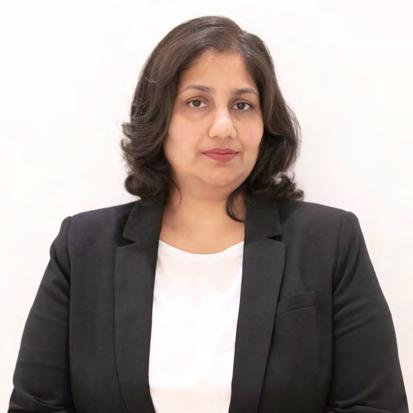
Institutional Digital Asset Custody Will Underpin The Future Of Financial Infrastructure


With proven mastery of navigating India’s capital markets, our dedicated Indian team and seasoned professionals from London, offer comprehensive solutions for foreign investors, namely: .
• Strategic Advisory: Providing a strategic roadmap to meet your regulatory and compliance and due diligence requirements.
• Seamless Onboarding: Leveraging deep ties with SEBI-registered entities, to guarantee seamless market entry.
• Regulatory Interpretation: Translating the complexity of India’s regulatory framework into actionable steps.
Beyond the aforementioned services, we offer extensive compliance support and comprehensive administrative solutions, which help navigate the intricate landscape of regulatory requirements and risk management.
In conclusion, immense opportunities often come with intricate challenges. Let SteelRose Legal be your trusted guide through India’s regulatory maze, and unlock India’s potential together. Together, we can navigate the compliance norms, embrace the opportunities, and thrive in one of the world’s most exciting and promising investment destinations – India.
Zu Tohtayeva
Founding Partner
SteelRose Legal Ltd
zu.tohtayeva@steelrose.uk
www.steelrose.uk
Recent market events such as the collapse of crypto-native exchanges, custodians and investment firms have raised concerns about the industry’s stability. These events have had major negative impacts on our societies, as millions of individuals and companies lost considerable capital. And yet, market participants, both retail and institutional, are convinced about the opportunity and continue to invest in the market.
Corporates worldwide continue to advance their adoption of blockchain technology. A recent survey by Citi Securities Services reveals that nearly three quarters of institutions are currently actively engaged in blockchain and digital asset initiatives, with the lack of institutional-grade digital asset custodians a major barrier to widespread adoption.
The critical question is whether we can establish a safe, trusted and compliant environment for digital assets, mirroring established financial markets? Given the growing momentum, protecting digital assets has become a pressing societal issue.
Recentralisation is the future
reliable gateway to access digital assets. Regulators worldwide, including those in Hong Kong, are increasingly urging banks and regulated financial institutions to provide alternatives to the current offerings.
A safe, compliant, agile alternative
Metaco, from the outset, aimed to address these challenges by offering institutional-grade technology for secure digital asset custody and management. Our vision revolves around involving regulated financial institutions in the digital asset market, enabling ‘Market Definers’ such as global custodians and top tier banks to invest now in institutional infrastructure that not only brings stability but also paves the way for global interoperability standards, crucial for broader digital asset adoption.

We continue to provide bank-grade digital asset technology which underpins robust institutional offerings in more than 20 jurisdictions across 5 continents, transforming capital markets in the years to come. Crucially, the use cases enabled by our technology boast a flawless record of safety, with zero security breaches, zero internal fraud cases, and no asset lost.
Institutional digital asset custody offerings are the cornerstone of our future financial infrastructure. Compliant custody platforms integrated with financial institutions’ existing risk management and governance processes are vital to facilitating the transfer of value between issuers and investors. As the landscape continues to evolve, mastering digital asset custody will likely become a prerequisite for any financial institution aiming to stay competitive in the modern financial marketplace.
Sonal Mulay
Head of Compliance
SteelRose Legal Ltd
s.mulay@steelrose.uk
www.steelrose.uk
Established financial institutions are well placed to unlock this opportunity for everyone. They have the trust, large balance sheets, the networks of liquidity, in addition to a large captured customer base with unmet needs, all while operating under high levels of compliance and strong relationships with regulators.
The regulated financial sector has both a strategic and moral obligation to safeguard consumers and institutions through the provision of a secure and
 Seamus Donoghue Chief Growth Officer, Metaco
Seamus Donoghue Chief Growth Officer, Metaco
11 10
Digital assets are entering the mainstream, radically changing the way value is created, represented, transferred and accessed. They have a huge potential to dramatically eliminate risk, enhance compliance and increase the operational efficiency and scalability of the financial infrastructure that governs society’s economic flows.
The Future For Network Managers Is Automated – And Regulated


The financial markets are in the thick of a shifting landscape of technological developments and geopolitical challenges – Derek Duggan of Thomas Murray looks at the trends all Network Managers should be ready for.
Post-trade and sub-custodian monitoring updates
Our Network Managers (NMs) have found that the return to onsite monitoring after covid has increased transparency. NMs have greater insight into the strategic direction of sub-custodians, which is becoming more focused on technological capabilities, cyber, and progress with data integration goals. The pandemic has also spurred a shift to further digitisation, benefiting both bank and market processes. There is little to differentiate the core custody services provided by sub-custodians –however, the custody world is changing, meaning NMs need to adapt their monitoring to review different risks.
Cash correspondent monitoring
Global regulations and third-party governance practices have necessitated supplementing financial oversights with an additional operational risk assessment of cash correspondents. Our collaborative, industry-driven approach is a lens on existing providers, and provides benchmarking of where groups sit relative to peers and new market entrants. We’re seeing more demand for this service after the collapse of Silicon Valley Bank and the merger of Credit Suisse and UBS, which creates a lack of CHF providers. This keener focus on concentration risk looks set to continue.
Financial market infrastructure
Thomas Murray’s financial market infrastructure team monitors and analyses efficiencies and risks across 105 investable markets, 145 Central Securities Depositories and 28 Central Counterparties, to provide unique market intelligence in real-time to many of the world’s largest banks. Our advisors work with FMIs to improve their operations and risk management.
FMIs are enhancing operational efficiency and risk management for several key reasons. The first is a rapidly changing regulatory environment – the EU’s MiFID III and Digital Operational Resilience Act (DORA) will both have far-reaching implications.
The second factor is the increasing number of FMIs with more diversified business models triggered by a combination of the long-term stagnation of trading volumes and IPOs, and a continuous challenge on post-trade costs from custodians and their clients, eroding FMI core revenues. To mitigate exposures, non-financial risk management will need to expand past an FMI’s core functions.
Finally, there is the threat of cyber risk. Until now, securities market infrastructures have gone largely untouched – but recent attacks suggest that nation state actors and criminals now recognise their systemic importance. Making cyber resilience and good hygiene a market requirement with central oversight and continuous monitoring will be essential to combatting this growing menace.
Fund service providers
Private equity managers and administrators are also dealing with increased regulatory activity (for example, the SEC rules that took effect in August) – much of it aimed at improving transparency in the funds industry. This reflects a demand for greater enforcement of anti-money laundering legislation and monitoring of sanctions lists as it does the importance of ESG.
At the same time, an ever-increasing volume of data must be supplied to a diverse range of stakeholders. Our SaaS teams see first-hand that data management is becoming key to avoiding reputational risk and regulatory compliance. The number of fund service providers still relying on manual processes is dwindling as the industry embraces automation for all aspects of due diligence, data management and data analysis.
Orbit Diligence
Our Orbit Diligence platform automates clients’ DDQ and RFI processes for a wide range of use cases. Access a library of off-the-shelf questionnaires and risk frameworks, freeing up valuable time and resources.
How Euroclear Is Charting Its Course As A Data And Digital-Enabled Financial Market Infrastructure
 Derek Duggan Managing Director Banks
Derek Duggan Managing Director Banks
 Thomas Murray
Thomas Murray
Our long-term vision is to bring safety, efficiency, and connections to financial markets through innovation. We aim to co-create solutions that meet emerging demands by collaborating closely with clients and partners. As technology and regulations evolve rapidly, these institutions must continuously adapt and innovate to serve their clients’ needs.
One of the key thrusts of our strategy is its Data and Digital-enabled Financial Market Infrastructure (D² FMI) initiative to harness data and digitalisation to transform market infrastructure. We envision shifting to an open shared platform with centralised data services available to all players. This effort can reduce costs, boost reach, and unlock client value. We have partnered with fintechs like Greenomy, Taskize and GlobalWatch to accelerate innovation in ESG data, exception management, and KYC.
We are also collaborating with partners to explore how technologies like Distributed Ledger Technology (DLT) can transform markets. DLT still faces adoption challenges, but we aim to support the ecosystem to unlock its full potential. Our innovative DNA drives our continued involvement in DLT experiments and solutions for clients.

As sustainable finance continues to grow exponentially, we are leveraging our position as a trusted and neutral FMI to navigate ESG growth. We can collect, validate, and share ESG data to address challenges like data standardisation, metrics complexity, and greenwashing concerns. Euroclear already provides custody services for nearly €1 trillion in green bonds, validating massive market growth.
Our culture remains vital in attracting and retaining talent and delivering client value. While safety and efficiency are paramount, we are enhancing our culture of collaboration, creativity, and client-centricity through initiatives like hackathons. Our leaders also play a crucial role in championing our evolved cultural vision.
As we celebrate over half a century of market infrastructure leadership, we remain dedicated to growing and evolving to enable tomorrow’s financial markets. Our approach blends innovative thinking with traditional values, allowing us to navigate the constantly changing landscape of technology, regulations, and client needs. By using data and technology to improve our services, we have already made great strides towards our vision of becoming a collaborative D² FMI where the client takes central stage. Our priority is to continue innovating safely to offer our clients even better efficiency and value.
Learn more at euroclear.com
Philippe Laurensy Head of Group Strategy, Product Management, and Innovation Euroclear group
13 12
As a Financial Market Infrastructure (FMI), we have always played an essential role in ensuring the smooth functioning of capital markets. However, with the rapid evolution of technology and regulations, it is crucial for institutions like ours to continuously adapt and innovate to meet the needs of our clients.
Spinning Out Of The Office!
Many across The Network Forum community would usually associate me with abbreviations such as CSDR or T+1, however, there is another one which is even closer to my heart – D&B DJ! Yes, that is right, outside of my day job, I am a Drum & Bass Disc Jockey and radio host, going by the alias “LOGIKL”!
every moment of it. Then in 2005, was delighted to embark on my new career in banking, it was the start to a new chapter in my life and dedicated a lot of time and effort towards it. However, gradually the music started to take a back seat, stopped DJing and music production. Unfortunately, there was just not enough time for it anymore.
In 2016, whilst relaxing with family on Boxing Day and recovering from the seasonal festivities, I had an epiphany. Something was missing, I realised that I needed an outlet, we all need an outlet, something we do for ourselves in our busy lives, whether it be sport, leisure, or art, for example. Essentially something that helps to keep the mind focused and relaxed as and when it needs to be.
So, I decided, I will get back into DJing and music production. I was sceptical at first, I thought my mind would not be as creative as I was as a free-spirited student. Nevertheless, I started, and in true financial analyst fashion began to thoroughly research the latest equipment, software, and DJ techniques. My ultimate goal was to get back to being a DJ live on the radio, which is what I enjoyed doing the most.
Often when I tell people host my own radio show, funnily enough the first question most will ask me is “what topics do you discuss on your show?”. This perception may be because I am a frequent speaker at The Network Forum annual meetings! However, it is great to see the amazement on their faces when mention that it is not a topical discussionbased show, but actually, one where I get to mix and present my favourite Drum & Bass music live on-air for a couple of hours.


You may be thinking, how did I get into it in the first place? Well, I have always had a passion for music. At university, I regularly performed as a DJ at clubs and on the local student radio station and loved




Fortunately, thanks to the networking and negotiation skills learnt during my time in the industry, I struck up a relationship with the production manager of local community radio station in Guildford called Kane FM. Staffed by volunteers, Kane FM provides a platform for non-commercial music, addressing inclusion and engagement of the community, encouraging participation, and providing opportunities for volunteering and improving technical, social, cultural, and artistic skills.
Eventually one thing led to another, and to my immense delight was presented the opportunity to host my own fortnightly show on the station!
In 2018, I was thrilled to launch my live radio show named “LOGIKL Progression” where had the freedom to curate and showcase the latest Drum & Bass music to Kane FM’s local FM and global online audience. During the COVID-19 lockdown I increased the frequency of my show to weekly. Having a creative and social outlet during the difficult lockdown period was also particularly important. The popularity of the show grew significantly, to the point I was being recognised by some of the major figures and record labels in the scene. This led me to get involved with a popular record label called Four Corners Music, with whom I have had the opportunity to DJ at live events once again. It has been incredible to perform almost some of the most prominent figures in the Drum & Bass scene.
5. Pre-recording shows – given flexibility works both ways, sometimes there are unavoidable situations where work will always take priority, in such cases the radio station allows me to prerecord shows in my own time and automatically broadcast on-air when I am not available.
When it comes to workplace flexibility, I strongly believe that we all have a shared responsibility to lead by example. Knowing that my firm and team support me with my personal endeavours only furthers my motivation and dedication at work. I would like to take this opportunity to express my thanks to all my family, friends and colleagues who have supported through my musical journey.
Finally, I would like to focus on workplace flexibility and making it happen. Having spent over 18 years in the industry, one thing I realised is that playing to your strengths and being yourself at work are key attributes to build a long term and hopefully successful career. leveraged several workplace flexibility options and benefitted from the support of the people around me to help fulfil my personal ambitions, they include:
1. Leaving the office early – I have set aside time in my diary on the day of my shows, my team respects this time and works around my schedule.
2. Working from home – depending on my meeting schedule on the day, have the option of working from home to maximise my working time, whilst offering me the flexibility to be closer to the studio.
3. Teamwork – flexibility does not work without good teamwork and communication, know my team will support me when I am out of the office, and I will do the same for them.
4. Commuting during lunch – essentially a hybrid of points 1 and 2, where my diary permits, I will use this option, it is a much more peaceful commute and often quicker as well.
For those who are interested to tune-in and follow my “LOGIKL Progression” show on Kane FM, you can listen live every Wednesday fortnightly at 19:0021:00 (UK) on 103.7 FM (locally in Surrey, UK), online at www.kanefm.com or by requesting “Kane FM” via smart speaker. In case you miss it or want to listen back to any of my previous shows, you can do so at www.mixcloud.com/logikldnb and follow me for updates on the popular social media channels using the handle @logikldnb.
 Sachin Mohindra Executive Director, Goldman Sachs
Sachin Mohindra Executive Director, Goldman Sachs
15 14
Sweet Harmony: Driving Efficiency In Chile, Colombia And Peru
Increasing efficiency is a primary goal for post-trade. That said, efficiency initiatives across the world’s markets focus on different areas and are rolled out at varying speeds. Keeping up with changes can be difficult.
Today, when talking about efficiency in the Americas, we immediately think of shortening settlement cycles. However Colombia, Chile and Peru are targeting much deeper transformation, which will have long lasting impacts and potentially simplify a shift to T+1.
Market infrastructure harmony
The integration of capital markets is a major topic of discussion. Initiatives like the Pacific Alliance and MILA (Mercado Integrado Latinoamericano) have been at the centre of economic and political conversations for almost two decades. The ambition is to attract more local and international investment, while streamlining operational processes.
Since 2018, a multidisciplinary industry workgroup led by the Chilean, Colombian and Peruvian stock exchanges has been busy on a project to integrate all three stock markets. Creating a common market with one single stock exchange supported by a unified platform will help ensure seamless interoperability.
The advantages of greater harmonisation are well known. Participants will have access to a wider range of securities, benefit from streamlined processes, and reduced costs. This is expected to pave the way for enhanced liquidity management, standardised risk controls and harmonised trading protocols. Thus, massively increasing efficiency.
The T+1 question
The above harmonisation is brought into keen focus given the move to T+1 in North America. The shift to a shorter settlement cycle for equities markets is a pivotal element under technical review within the integration project framework.
While preliminary, the discussions around this transition have ramifications on trade compression and margining methodologies. While it presents multiple challenges, transitioning to T+1 may provide operational efficiencies, not to mention reduced counterparty risks.
Prior market integration could greatly facilitate T+1 implementation. An integrated platform, with one single exchange and standard processes for clearing and settlement, will allow consistency across the three markets. Even though alignment with the go-live of the American and Canadian markets would have been beneficial, there isn’t yet a specific timeline for Colombia, Chile and Peru to migrate. There is still a lot to analyse.
A partner to execute global themes locally


BNP Paribas is a leading voice in the market harmonisation project and T+1 discussions across the three countries. We recognise the significance of the projects, and the opportunities for growth that they represent for capital markets across the region.

As a custodian, our aim is to work closely with the market infrastructures, accommodate the operational and system changes required for a fully integrated market, and migrate to a T+1 settlement cycle when the time comes.
We will ensure all risks and challenges are identified and communicated to our partners, giving a voice to non-resident investors particularly. We will leverage opportunities that a project like this can bring our clients, ensuring operational and cost efficiencies are passed on.
We will be at the forefront of this change, driving efficiency for our clients throughout.
New Regulatory Framework For Investment Funds In Brazil - Resolution 175
The new resolution of the Brazilian Securities and Exchange Commission (CVM) consolidates the existing regulations with more standardized, flexible, and modern rules for investment funds
The year 2023 is a transition year in Brazil, and not only due to a new government in the country.
On the financial capital markets front, there are relevant changes with much impact on the funds industry, as a result of CVM Resolution 175, released in December 2022, establishing a new regulatory framework for investment funds in this market.
Reflecting important concepts from Brazil’s Economic Freedom Law (Law No. 13,874/2019 ‒ LLE), the mentioned Resolution brings together Brazil’s investment funds regulatory framework into a single rule, with a general section applicable to all types of funds and annexes with specific rules applicable to each type of fund.
Resolution 175 also establishes specific guidelines for the functioning and operation of funds and managers, including their investment policy, settlement, custody, and exposure limits. It aims to balance the activities of fund service providers, bringing greater clarity to the duties and powers of each participant. The implementation of the Resolution could result in new opportunities for small and medium sized fund managers.
indexes. The new rules also allow for the formation of funds of any type with subclasses subject to different rights and obligations, even if they share the same portfolio.
(II) Expanding the limits for their investments abroad.
(III) Making access to investments in Credit Right Investment Funds (“FIDCs”) possible. Previously, only qualified investors had access to such investments.
(IV) Allowing funds to invest directly in crypto assets. So far, this was possible only via third-party funds, or abroad (in countries where crypto assets were regulated).
(V) Segregating the fees paid to managers, administrators, and distributors, and clarifying the limitation of the investor’s liability on the invested amount. In the absence of limitation of liability, the investor may be liable for any negative portfolio value of the fund.
(VI) Establishing guidelines for socio-environmental funds, determining (i) how they should be denominated and (ii) the disclosure of information about these products.
The new Resolution shall be effective on October 2nd, 2023 (except for the segregation of classes and subclasses of funds, which will only be in effect as of April 1st, 2024).
Felipe Maldonado Head of Financial Intermediaries and Corporates Client Line, Colombia, Chile and Peru – Securities Services, BNP Paribas
The resolution’s most significant change is the redistribution of responsibilities between asset managers and fiduciary administrators. Many managers may not have adequate teams or systems to handle such tasks and will need to strengthen their middle- and back-office structures. Managers will become legally responsible for the investment decision (which previously was not clearly regulated), to frame portfolio limits and to hire administrators and distributors. Currently, these responsibilities are centralized with the administrators that hire asset managers and other service providers for their funds. The administrators will remain responsible for the funds’ administrative activities (such as accounting and appointing their custodian and external auditors).
Other significant changes brought by Resolution CVM 175 include:
(I) Establishing that a fund may have classes and subclasses of quotas, allowing it to segregate target investors, minimum application values and different management fees. So far, the manager needed to create new funds to differentiate terms, fees, and
Any new funds must comply with the rules from day one, while existing funds will have until December 31st, 2024, to comply. FIDCs, though, must be compliant by the April 2024 deadline.
We strongly believe that these rules will bring greater legal certainty and more transparency to investors, which, on the one hand, will contribute to the industry’s growth, bringing the Brazilian market closer to the best international practices and making it more attractive to non-resident investors.
 Gianluca Adas Sales & Product Management Custody for International Investors S3 CACEIS BRASIL
Gianluca Adas Sales & Product Management Custody for International Investors S3 CACEIS BRASIL
17 16
From Greek Tragedy To Greek Triumph
The Network Forum (TNF) Annual Meeting returned once again to Athens last June for the first time since 2019. But, what were the main talking points from this year’s TNF?


Eight years ago, Greece’s economy – to put it bluntly – was on the brink of total collapse, as the country’s sovereign debt crisis reached its nadir.
Amid capital controls, bank closures and strict limits on cash withdrawals, the risk that Greece would exit the EU and euro altogether was a very real one. So acute was the turmoil that rumours circulated that the Greek government had contingency plans in place to start printing Drachma.
While uncomfortable for many Greeks, the implementation by the government of deep rooted structural reforms – including tough austerity measures and pension cuts – helped stabilise the economy, and put the country on the road to recovery.
Fast forward to today, Greece’s economy is an outlier, only because it is performing so well.
Despite the energy crisis and inflationary pressure stifling eurozone growth, Greece’s GDP increased by 5.9% in 2022, sparked by strong investment activity and a rebound in tourism post-COVID.

Few expect Greece to lose this growth momentum.
Geopolitics takes a dangerous turn
The world is at a perilous juncture.
Speaking at TNF, a geopolitics expert highlighted the Russia-Ukraine war is in a stalemate. He said Ukraine’s counteroffensive is not succeeding in a strategic sense, although added that neither exactly was Russia’s campaign.
Should this deadlock persist, the expert said President Putin will likely be forced to call up more reservists to fight, a decision which could have serious political ramifications.
The timing of TNF was fortuitous, taking place just two days before an armed mutiny against President Putin, which at one point looked like it would descend into civil war. While many would cherish the idea of removing President Putin from power, the reality is more complicated. For starters, President Putin – should he be overthrown or killed - will not be replaced by Russia’s equivalent of Jeremy Corbyn, but rather by someone even more right wing than himself, who will probably escalate the conflict further. Although Ukraine currently enjoys popular backing, the expert warned this may not last indefinitely.
He highlighted the US has spent vast sums of money on providing military assistance to Ukraine, and much of it has not been properly audited. With the US facing its fair share of domestic challenges (i.e. an opioid epidemic, a crisis in the country’s education system), the expert warned voter support for aid to Ukraine was waning, especially among Republicans.
Having dealt with two global crises in the space of just three years now, it is not surprising that network managers are paying closer attention to geopolitical risks and contingency planning.
Future proofing network management
The role of the network manager is one that is continuously transforming.
Firstly, network managers are having to familiarise themselves with new asset classes (i.e. digital assets such as security tokens) and digital asset custody solutions. As digital assets become increasingly ubiquitous, network managers will need to update their due diligences accordingly.
Although banks are developing digital asset custody products, few expect these services will be profitable anytime soon.
Once looked upon by critics as a cynical marketing ploy, ESG is gathering momentum, and network managers are having to adapt. Many are now incorporating ESG into their due diligence questionnaires, and this is a trend which is only going to continue, especially following the introduction of EU regulations focusing on sustainability (i.e. Sustainable Finance Disclosure Regulation, the EU Taxonomy, etc.)
While network managers have shown themselves to be more than capable of adapting to change, succession planning appears to have fallen by the wayside. A speaker said network managers often had long tenures, which sometimes made it hard to bring new talent into the fold.
The lack of generation Z talent in network management is a cause for concern, and could make succession planning more difficult as and when today’s cohort of veterans retire.
The EU wavers on shorter settlements
With the US and Canada primed to adopt T+1, all eyes are now on the EU, and what it plans to do.
Experts highlighted that while shorter settlement cycles could lead to cost and risk benefits, its potential implementation in the EU is likely to be far more complicated than in the US and Canada.
Notwithstanding the operational challenges T+1 will create (i.e. settlement mismatches, less time to carry out asset servicing, higher risk of trade fails), the EU has 41 trading venues, 31 CSDs, 31 CCPs and 14 different currencies across its 27 member states, in contrast to the US and Canada, whose markets are much less fragmented.
Achieving consensus among EU FMIs on T+1 will not be straightforward.
Adoption of T+1 could also result in financial institutions incurring massive fines (and maybe eventually mandatory buy ins) for trade fails under the Central Securities Depositories Regulation (CSDR) - another obstacle that may delay T+1 in the EU.
Expect the debate about the pros and cons of introducing T+1 in the EU to be a recurrent feature at TNFs for some years to come!
Charles Gubert Founder, GTL Associates
19 18







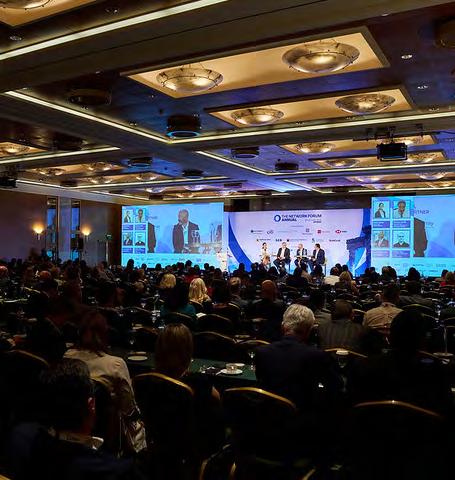
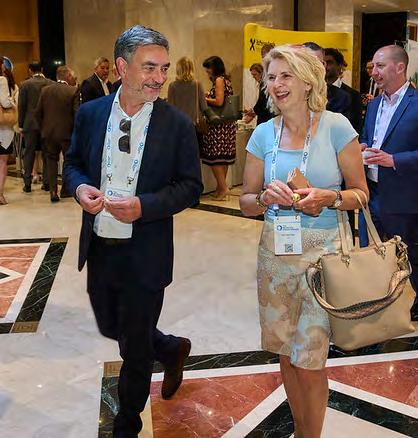
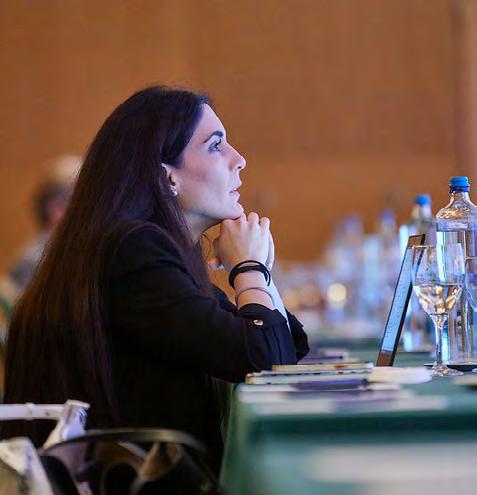

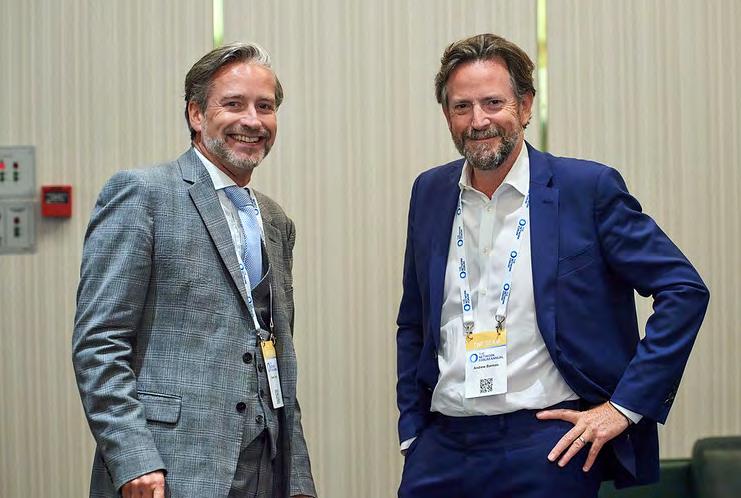
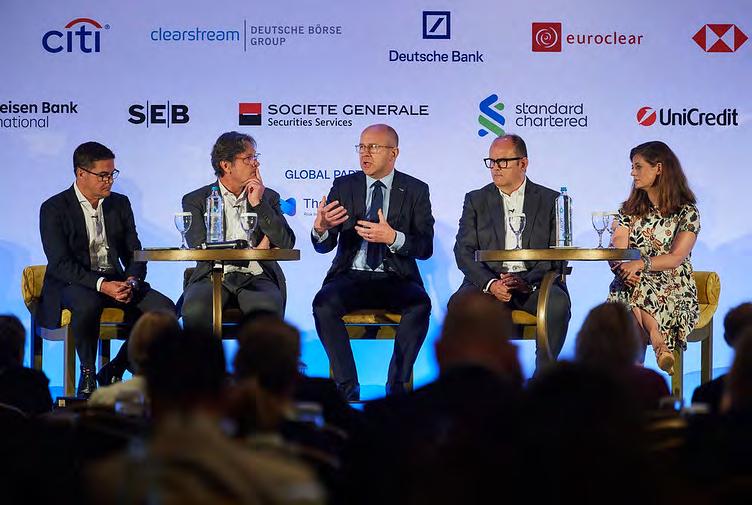
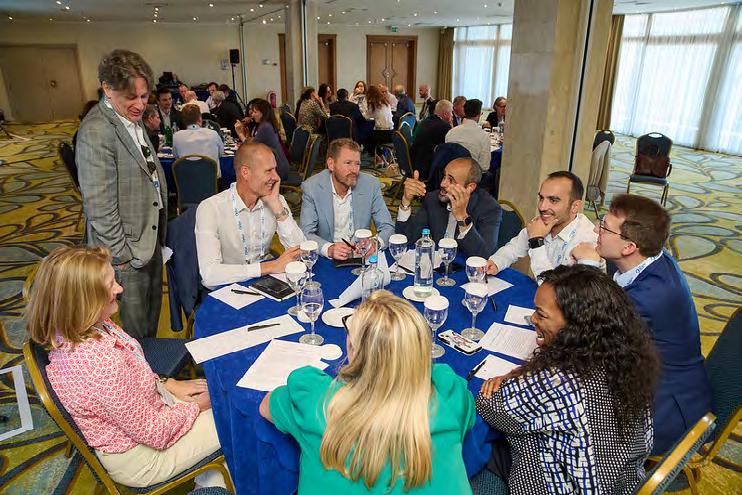
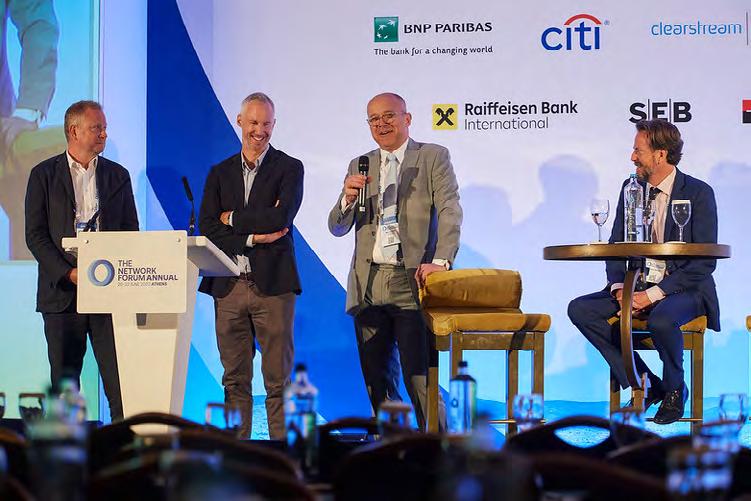
21 20 Annual 2023 Annual 2023




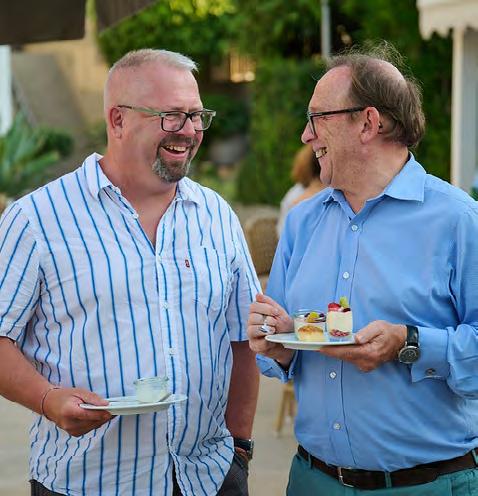
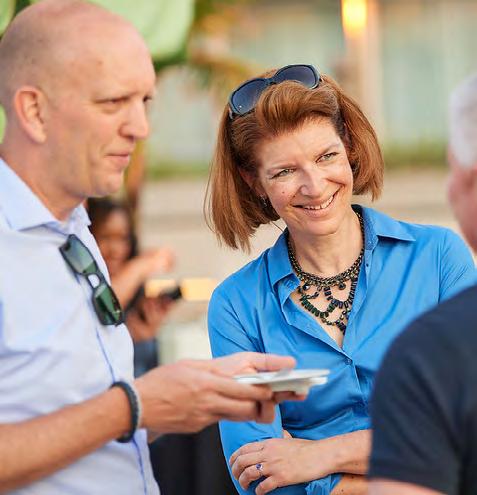



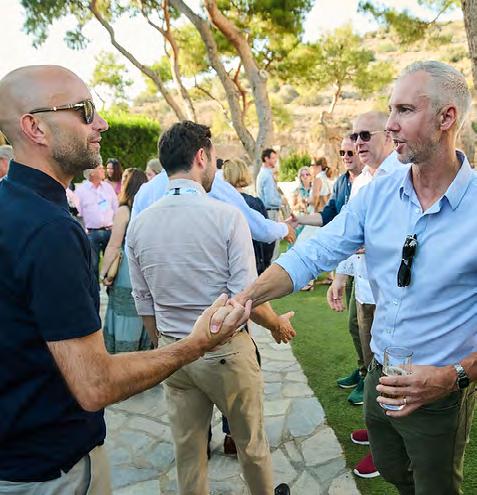







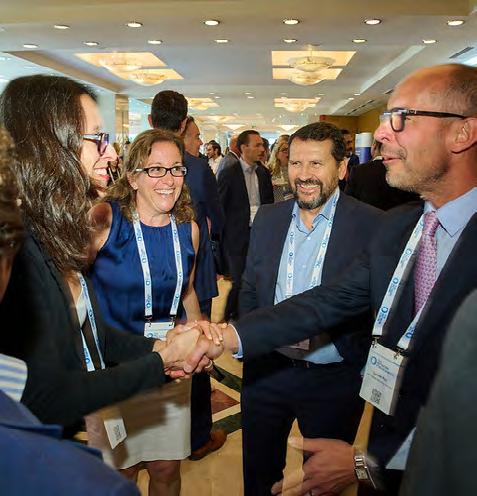
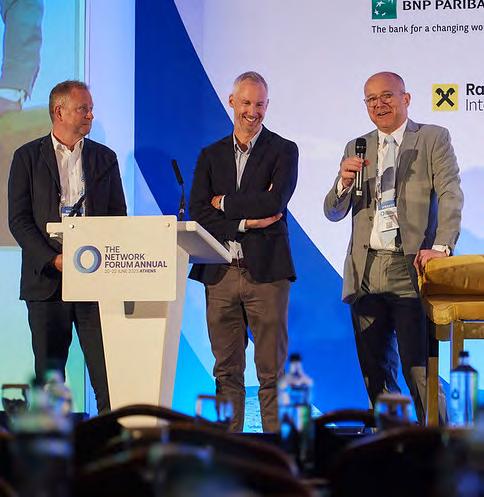
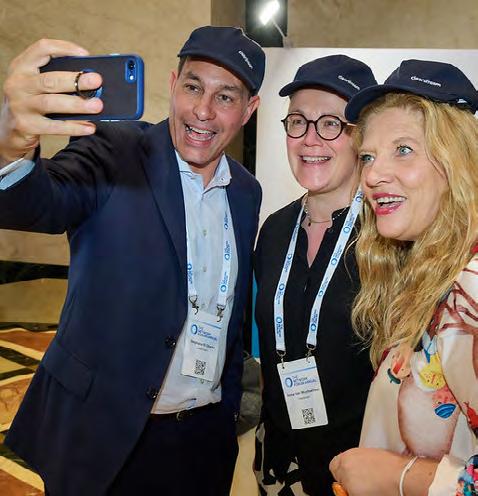
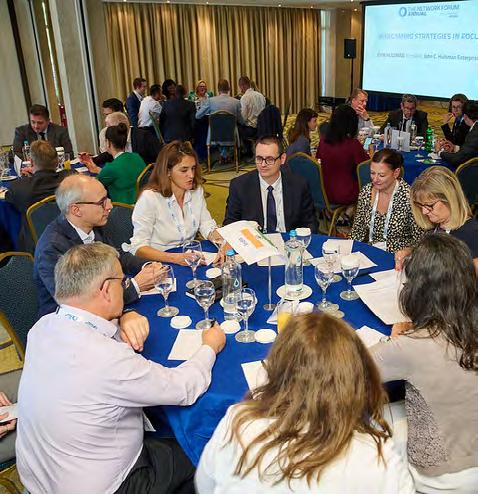
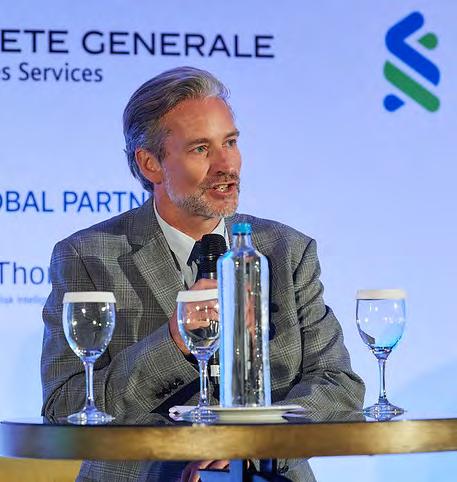
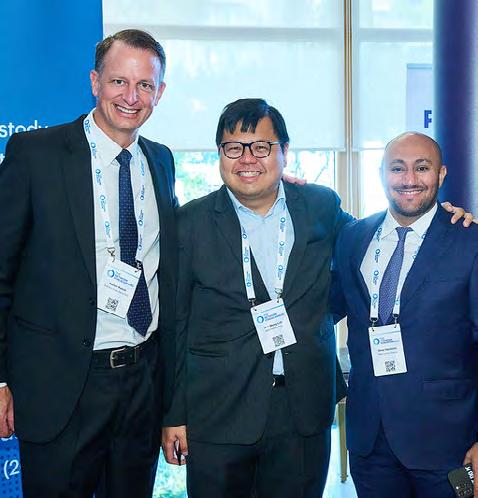
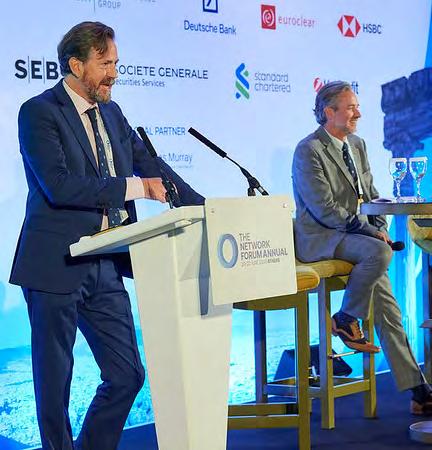
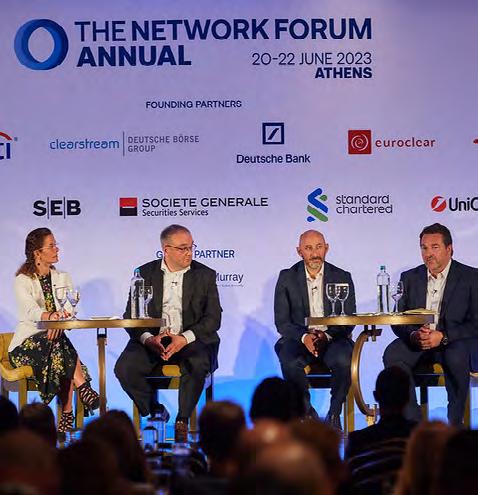
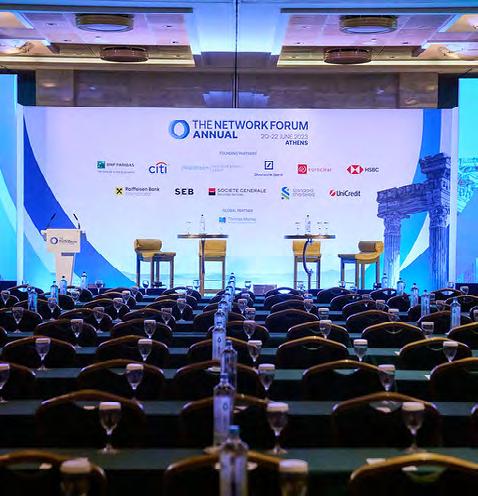
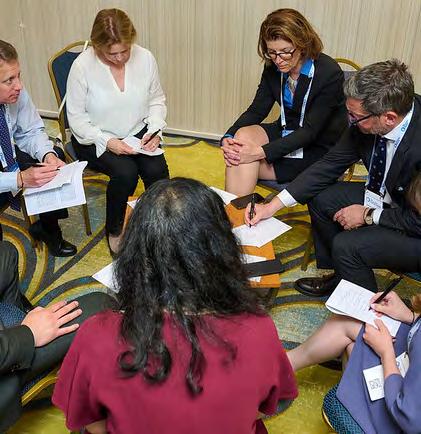
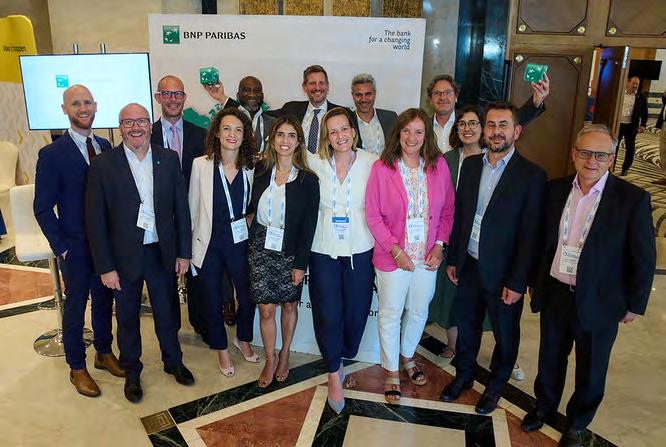
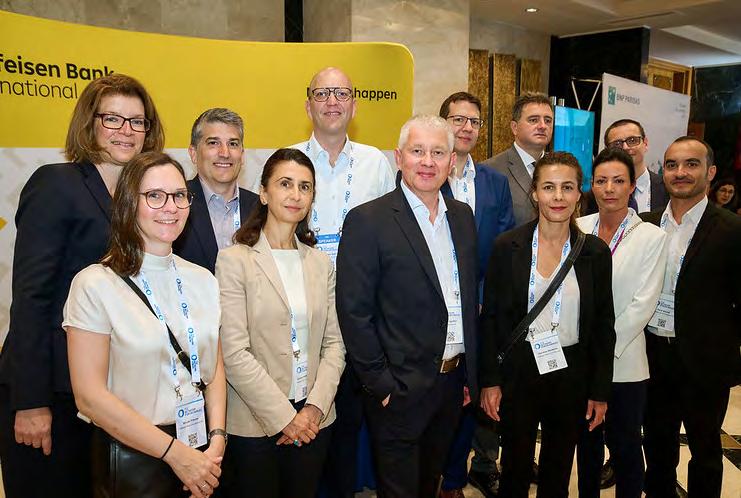
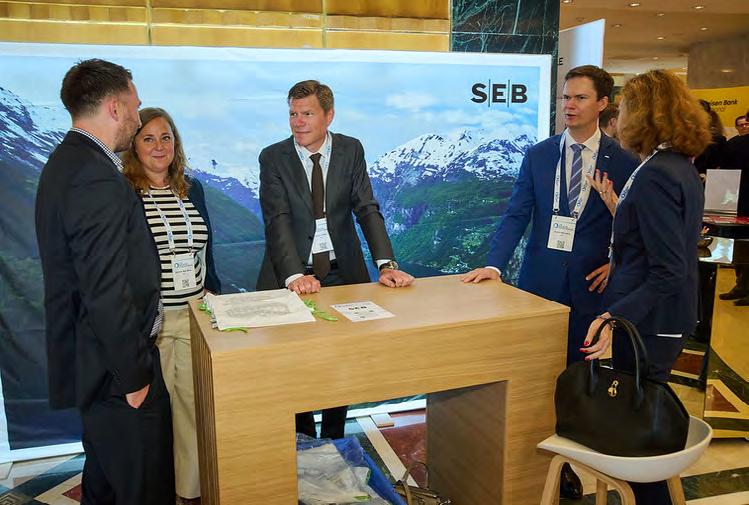
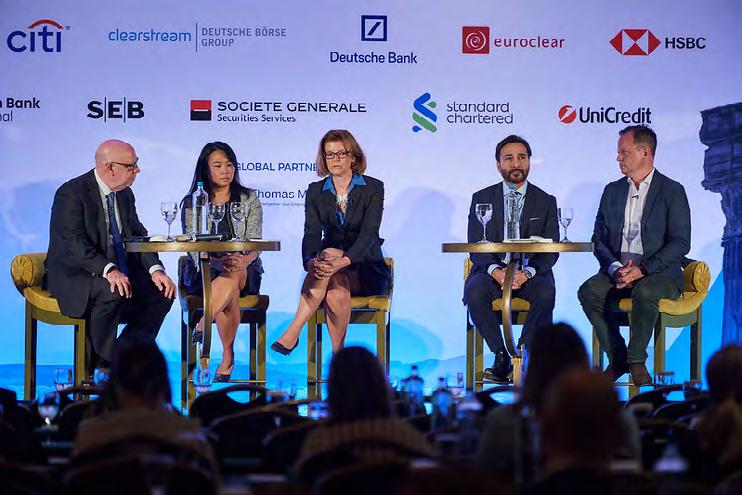
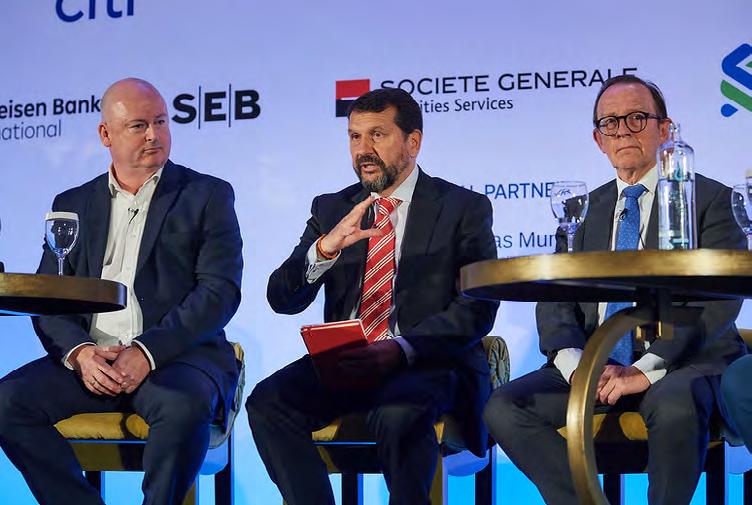
23 22 Annual 2023 Annual 2023
Greece Is The Word
An Ode by Rupert Booth
We got chills - they were multiplying, We were losing control!
TNF’s power - it was sublime…
It’s electrifying!
I’m sorry – you all know where I’m going with this, Quoting from Grease - hmm - a bit hit and miss… But - we were in Athens so I’m trying to be witty, So read on below, though I know it ain’t pretty.
I have to begin with a horrible story, About a tax ID number by the name of EORI That nearly stopped efforts for stands at the show, Even the couriers - the experts - they don’t seem to know;
Now the UK’s alone, no thanks to Brexit, Imports to Greece won’t go and that wrecks it! It’s complicated, really, in truth rather boring, I began telling Paula* til I heard her snoring… But we made it! and the TNF guys they came through… With the solution, no surprises - it’s just what they do.
And what of the conference, its speakers, its streams?
The panels, the content, why they burst at the seams, With resilience discourse and operational themes, Financial elixir - the stuff of our dreams!


AI, DLT and yes, T+1; The acronyms flowed - we had so much fun, Discussing the issues - and the problems, it’s true; One day we’ll solve them and then what will we do? We’ll be out of a job, that’s what, and we’ll all be, Stacking the shelves at Tesco and ALDI. So we better get on finding stuff to concern us, Or we’re all in big trouble and what will that earn us?
Nothing! Because we’re in this together –Pals, business partners, birds of a feather… Get this stuff done and go hell for leather!
In the company of Execs at the height of their powers. Conviviality flowed - but in equal measure With brainstorming sessions to quicken the hours; Gold to go home with – pure business treasure! All told, a fantastic environment to be in, Operational debate ‘next the azure Aegean… Apologies, waxing poetic got the better of me, But don’t worry guys, you get this for free!
You bankers and buffs, from whatever nation, You shone, discussed regs and rampant inflation, Danced through the night, and with every gyration, Fuelled your fires with another libation.
Alas, it is sad, all good things must end, Probably best, with hangovers to mend, Brains to re-charge, a vast inbox to face, Deals to get done and prospects to chase.
But fear not, as I finish – well I’ve tried to condense it (!)It comes round again, next year, we can sense it; This carnival, this heady financial delight Is everywhere, get cracking and book your next flight, For Muscat, Mumbai and of course New York City –If you get past your boss and the expenses committee.
Right - I’m off to make my sandwich for lunch, And I’ll consider, nostalgic, as through it I munch, A Greek salad for dinner, as a tear from my eye Wells up for the TNF Athens gone by!
*Sincerest apologies to Paula Thistleton; I promise it won’t happen again.
25 24
















 Sinéad McIntosh Managing Director, BBH
Sinéad McIntosh Managing Director, BBH














 Seamus Donoghue Chief Growth Officer, Metaco
Seamus Donoghue Chief Growth Officer, Metaco

 Derek Duggan Managing Director Banks
Derek Duggan Managing Director Banks
 Thomas Murray
Thomas Murray





 Sachin Mohindra Executive Director, Goldman Sachs
Sachin Mohindra Executive Director, Goldman Sachs

 Gianluca Adas Sales & Product Management Custody for International Investors S3 CACEIS BRASIL
Gianluca Adas Sales & Product Management Custody for International Investors S3 CACEIS BRASIL




























































